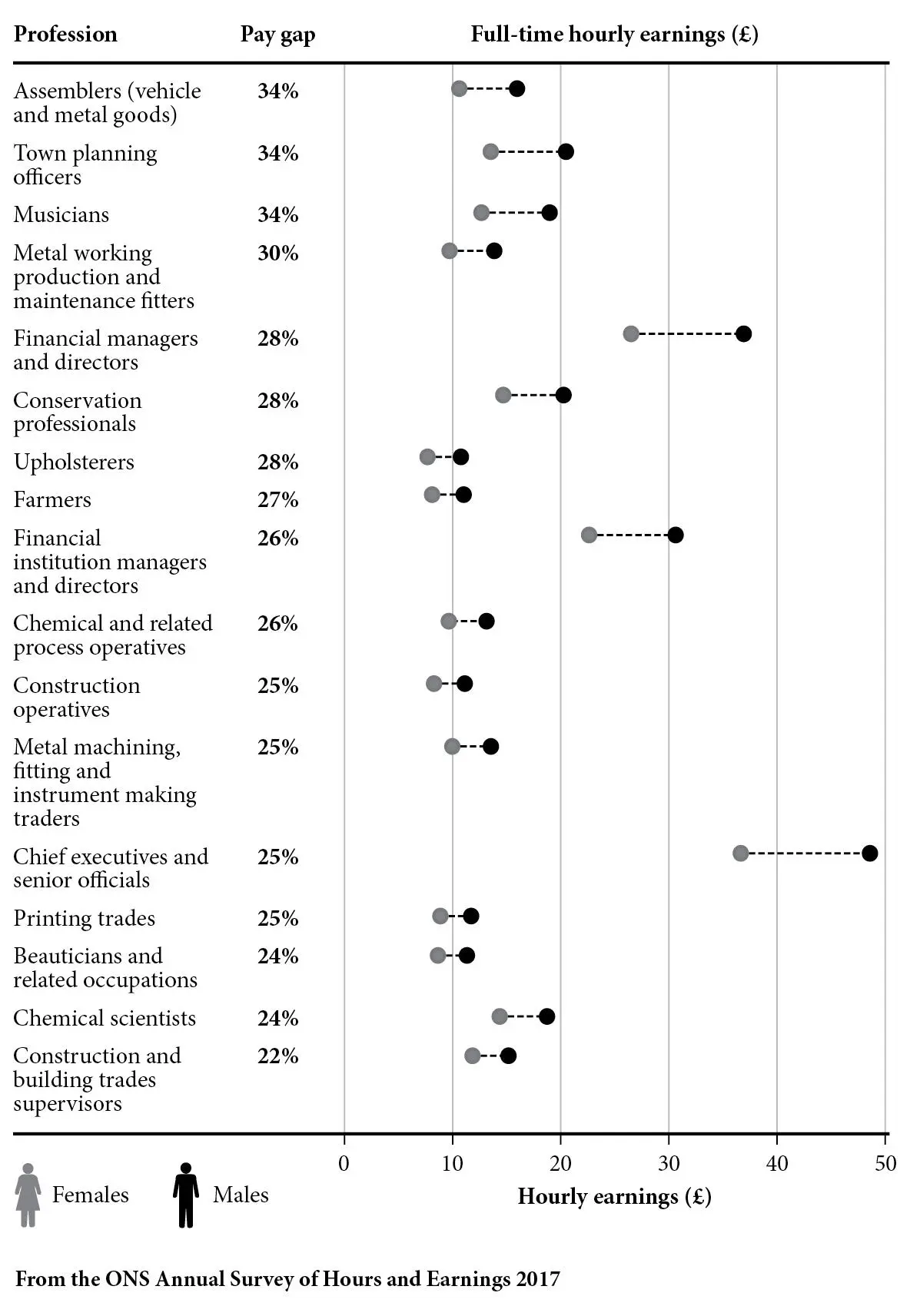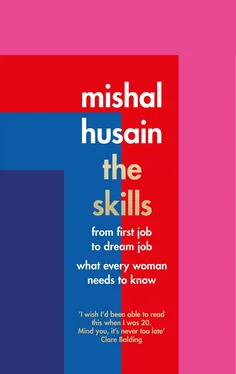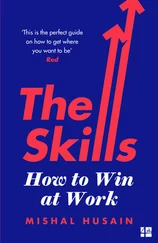As well as patterns evident within companies, there are others which emerge in comparisons of pay for men and women working within the same occupation. Data from the UK’s Office for National Statistics shows considerable variation in average hourly earnings between, for example, male and female financial managers and directors. Full-time men in that occupation earn an average of £35.52 per hour (or £72,000 per year), while the average for women is £24.29 per hour, translating into an annual salary of around £43,000. In the same 2017 data set, male town planning officers earned an average of around £20 per hour, while the figure for women was £14.50. Most of the roles where the gap disappeared or was reversed, so that women were earning more (secretaries and fitness instructors, for example), had hourly earnings at the lower end of the spectrum. 13
It is possible that these comparisons mask variations about the work done within the different categories: the scope and responsibility of the roles, whether the jobs were in the public or private sector, the region in which they were based and the skills, experience and competence of the individuals whose information went into the data set. But like companies’ gender pay gap figures, they can be a valuable starting point for a conversation about disparities. Perhaps the women had previously taken time out from work or been part-time for a period – but would that, or should that, fully account for the gap with comparable men once they returned to full-time?

According to the Institute for Fiscal Studies, part-time work can have a striking effect in shutting down normal wage progression. In general, pay rises with experience, but part-time workers, who are mostly women, miss out on these gains. ‘By the time a first child is grown up (aged twenty), mothers earn about 30 per cent less per hour, on average, than similarly educated fathers. About a quarter of that wage gap is explained by the higher propensity of the mothers to have been in part-time rather than full-time paid work while that child was growing up, and the consequent lack of wage progression,’ said a study published in early 2018. In what they called ‘the long-term depressing effect’ of part-time work, the authors also reported a significant impact on graduate women. ‘It is now the highest-educated women whose wages are the furthest behind their male counterparts,’ said IFS Associate Director Robert Joyce, ‘and this is particularly related to the fact that they lose out so badly from working part-time.’ 14
At Harvard, the economist Professor Claudia Goldin has examined the way different jobs are structured in order to see how this sort of pay penalty might be addressed. She’s pointed to how some occupations – including within business, finance and the law – generally pay a premium for people working longer hours. A lawyer expected to be readily available for clients and working sixty hours per week, for example, is likely to earn more than double the salary of a comparable colleague working thirty hours a week. Professor Goldin says this ‘non-linearity’ arises when the job is set up or has historically been done in a way that makes it difficult for workers to substitute for one another. Within this environment, those who work shorter hours will suffer a disproportionate wage penalty.
She contrasts that with what has happened in the United States with pharmacists, a high-income profession in which women are well represented. In the 1970s many were self-employed and the sector was dominated by small independent pharmacies, but now the majority are employees of large companies or hospitals. Part-time working is common, but pay tends to be perfectly in line with the number of hours worked – those who do fewer hours are paid proportionately less. Goldin attributes this to the ease with which pharmacists are able to substitute for one another – no single person is required to be available for an extended number of hours or for certain hours of the day. ‘The spread of vast information systems and the standardisation of drugs have enhanced their ability to seamlessly hand off clients and be good substitutes for one another. The result is that short and irregular hours are not penalised.’ 15
Professor Goldin says this structure helps to make it worthwhile for women to stay in paid work rather than leave to care for families, and that other professions could learn from the example of pharmacy. There will still be roles where employees won’t easily be able to swap in for each other – the founder of a business perhaps, or someone with unique and non-replicable expertise – but these should be fewer than is the case at present.
Elsewhere there is other evidence about how changing systems and processes could make a difference in areas where there are significant gender gaps – bonuses for senior doctors for example. When a BBC investigation showed that 95 out of the 100 highest-paid hospital consultants in England were male, ‘additional pay’, such as overtime or bonuses for clinical excellence, was a considerable factor. 16One consultant, Mahnaz Hashmi, told me what applying for the bonuses involves: ‘You have to fill out a lengthy form within a short time-frame of a few weeks, showcasing your achievements and providing evidence for them. If you are part-time you will have less to put down. In the early stages it feels like a lot of effort for relatively small bonuses, but they become more valuable as they accumulate over the years.’
The NHS process has also been based around consultants putting themselves forward. ‘Women seem to do this less,’ she says. But she also believes that achieving recognition in the system demands a willingness to put in a lot of your own time – for example by serving on awards committees in years when you are not yourself applying, thereby making sure you are up to date with the latest criteria and scoring schemes. ‘It’s difficult to do when you are part-time, and if you come back to full-time later you usually find there’s already a wide salary differential between men and women consultants.’ My BBC colleague Nick Triggle says he was struck when working on the data by the self-perpetuating nature of the system. ‘Those working in the NHS told me younger consultants often only go for the awards after prompting from older ones, and there was a sense that senior figures are more likely to do this for those who remind them of their younger selves,’ he says. ‘The culture created, perhaps unconsciously, is one where men encourage other men towards the pay awards.’
In the summer of 2017, my own workplace was the setting for what turned out to be a lengthy row sparked by the BBC disclosing the salaries of the highest-earning on-air ‘talent’ – including presenters, contributors and actors – paid directly from the licence fee. 17The list, which included me, generated intense interest and comment: few people from ethnic minorities were among the ninety-six names, while people who went to private schools were over-represented, compared to the population as a whole. 18Most of the scrutiny, however, was focused on gender – the top seven earners were all male, and in some cases, there was a marked difference between the salaries of women and men appearing on the same programmes. The leading businessman Sir Philip Hampton, chairman of the drugs giant GSK, wondered why women broadcasters had let it happen. ‘How has this arisen at the BBC that these intelligent, high-powered, sometimes formidable women have sat in this situation?’ 19
The truth is that we didn’t know the picture until it was revealed. The disclosure sparked unprecedented conversations between colleagues, with women and men starting to share information about their salaries and, in some cases, their efforts to be paid equally to their peers. Some were in pay brackets that put them above the national average, others were not. And we wondered: if the system wasn’t treating women with agency and clout equally to men, what did that say about what might be happening to women elsewhere?
Читать дальше













